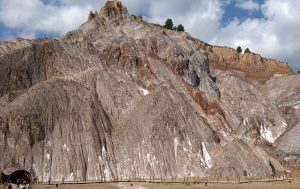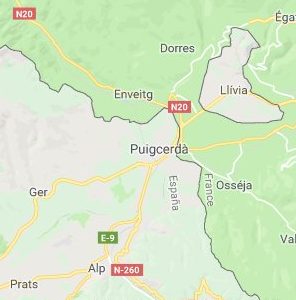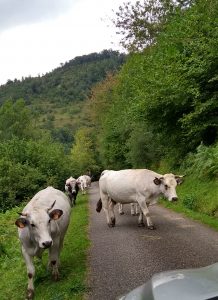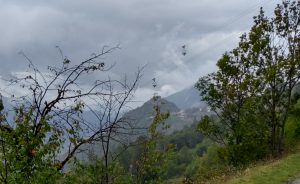
In early September our friends Theresa and Forrest were planning a trip to France, and we decided to visit them for a few days.
To get to Sarlat-la-Canéda we plotted a course through the Pyrenees just east of Andorra.
Our first stop in Spain was at the Salt Mountain of Cardona – back in the day, a source of great wealth for the Counts of Cardona, (including Wilfred the Hairy who is to Catalonia as George Washington is to the United States). The Muntanya de Sal is literally a mountain of salt — pushed up when the Pyrenees mountains were formed — and it’s been worked as a mine since before the Roman times.

After lunch we continued north to Puigcerda on the border with France. Interesting factoid – the town was unique during the Spanish Civil War for having a democratically elected Anarchist Council.
And then, over the border into France. But wait – what’s that up ahead? A tiny fragment of Spain completely surrounded by French territory! It’s the town of Llivia.
1500-2000 years ago, Llivia was the capital of Cerdanya (analagous to a county). In 1659 the Treaty of the Pyrenees ceded villages in part of Cerdanya to France — but due to its status as an ancient capital, Llivia was not considered to be a village, and remained part of Spain.
After passing through Llivia we stopped in eastern Andorra – beautiful high mountain pastures interspersed with the occasional ski town. These towns also have frequent visitors from France and Spain who come here to buy tobacco, alcohol, and sundry other items with low tax rates. Unfortunately, the free mobile phone roaming throughout the European Union does not hold for this country. The several hours we spent here nearly doubled our monthly mobile bill – so glad we didn’t spend too much time!

Down on the French side of the Pyrenees are numerous hot springs and spa towns that surround them, such as Ax-les-Thermes. In that town we popped in for a refreshing hour in the municipal spa.
From there, we discovered some narrow mountain roads that led to Appy – our lodgings for the night. This village of 20 or so had a B&B that Teresa discovered on Booking.com. One of the guests there spoke a little bit of English (because she worked as a secretary for NATO some 40 years earlier) and interpreted for us. I was surprised that people in these villages so close to the border with Spain didn’t seem to speak much Spanish (or Catalan). The main industry there was talc mining. The pit is up at the top of the mountain and they have something like a ski lift to bring buckets of talc down to the processing plant in the valley.
